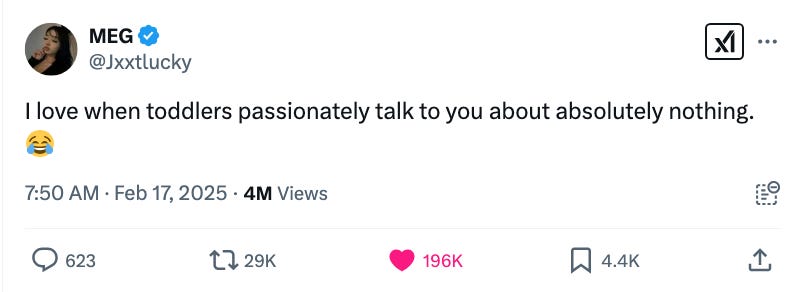😌 mood.
economic nationalism and platforms
I got to chat through what it means to “Buy Canadian” last week on CBC’s Front Burner w/ Jayme Poisson and CBC’s ‘Just Asking’ w/ Saroja Coelho. And Liz Pelly’s excellent new book Mood Machine: the Rise of Spotify and the Costs of the Perfect Playlist has been kicking around my mind, so I linked the two up in this essay.
As Canadians brace for Trump’s tariffs, many are turning to homegrown products. This moment isn't just about economic resilience—it’s an opportunity to embrace Canadian culture more fully and rethink digital marketplaces that have long undercut the earnings of the artists we love.
Spotify has revolutionized how we access music, and, by extension, who gets elevated, what we hear, and how much artists earn (or don’t). As of December 2024, Spotify boasts over 675 million monthly users, including 263 million paying subscribers. Streaming now accounts for most of the money generated by the music industry, and Spotify has the biggest share of that market.
In the excellent “Chokepoint Capitalism,” Cory Doctorow and Rebecca Giblin argue that Spotify, alongside major record labels, has “rigged” the industry by acting as a gatekeeper. Streaming’s business model keeps artists financially dependent and, ultimately, underpaid. Spotify pays about 67% of music revenue back to rights holders, but the money first goes to record labels, publishers, and other intermediaries, who take their cut before artists see anything. Major label contracts shrink payouts further. The per-stream payout? An estimated $0.00348 - so small it’s functionally invisible.
But that per-stream payout number is misleading. Spotify’s ‘streamshare’ model distributes payments based on an artist’s share of total listening, not individual plays. This means subscription fees don’t directly support the artists that listeners choose, leading some critics to argue for a more user-centric payment model where payouts would be based on what people actually listen to. Meanwhile, Spotify keeps squeezing musicians: last April, it eliminated payments for songs with fewer than 1,000 annual streams, and that same month, the firm added audiobooks into premium subscriptions. This expanded Spotify’s offerings without raising prices or increasing artist payouts.
Spotify’s long-term play might not just be controlling distribution—it may be reducing reliance on human artists altogether. In her new book Mood Machine, music journalist Liz Pelly has pointed out how Spotify actively promotes AI-generated music and algorithmically optimized background noise, which are cheaper to host and don’t require royalty negotiations. At the same time, many musicians, like session players, producers, and co-writers, often don’t hold the rights to their own work, and see little to no streaming revenue. If Spotify can replace real artists with AI soundscapes, it stands to recoup even more money while further devaluing human creativity.
Consumers exacerbate this trend because we’ve ceded control of our listening experiences to tech platforms. We now consume more music than ever, but often as background noise: moody playlists for working, studying, and showering. We’re half-listening while paying too little attention to how we’ve all allowed a digital platform to reshape the music economy to benefit itself, while artists are left scrambling for scraps.
The conversation is shifting. In the US, proposals like the Living Wage for Musicians Act and the Protect Working Musicians Act are emerging, and new forms of resistance are sparking fresh debates about creator compensation. But more needs to be done. Just as “buying local” is gaining traction in food and retail, maybe it’s time to think about listening locally, too. Direct consumption through physical media or Bandcamp-style platforms better values the culture we care about.
More needs to happen in Canada. Regulators championed Bill C-11, the Online Streaming Act, to boost the discoverability of ‘Canadian’ content. But without addressing the exploitative remuneration models that streamers impose on creators, that policy effort is incomplete. Ensuring people can find Canadian content is one thing; making sure the artists behind it can earn a living is another.
One proposal currently being litigated is a 5% levy on music streamers’ Canadian revenues, which would fund Canadian artists and level the playing field—similar to how radio broadcasters contribute. Industry groups like CIMA argue this policy is overdue, but streamers are resisting, claiming they already support artists through exposure and royalties. Yet exposure doesn’t pay rent, and as subscription prices rise while payouts shrink, the imbalance grows deeper.
Canada has long regulated radio and television to support homegrown artists, yet streaming has escaped meaningful oversight even though it’s now the dominant way people listen to music. While Canadian broadcasters contribute millions annually to support local artists, streamers have effectively operated in a legal grey zone, profiting from Canadian culture without reinvesting in it.
The question isn’t whether Spotify is convenient—it’s whether convenience should come at the cost of a living wage for musicians. Without intervention, we risk a future where music is controlled entirely by corporations, not creators. It’s time to make streaming pay.





It's probably outdated by now and Liz Pelly's book probably has better, more in-depth research, but I had actually produced a paper during the MPP on the economics of Spotify, in consultation with some Canadian musicians that I know!
I've forwarded this to my teens/uni students for reaction. They were mortified at my decrepit oldness when they found out my playlists *aren't* organized by "mood." A solid half of what they listen to are Lofi Girl streams, which I think is just elevator music for Gen Z?
We actually offered a potential family holiday to Montreal and tickets to Osheaga. Dad and I promised to keep our distance. They're both old enough to drink in Montreal this summer. But they couldn't wrap their heads around seeing non-headliners. Or the idea that you might go with a friend (or in this case, sibling) to see an act you're not a personally huge fan of. Music is something you listen to in headphones, by yourself. It's not like a shared activity for them.*
*None of the above applies to Taylor Swift. Who transcends - everything.